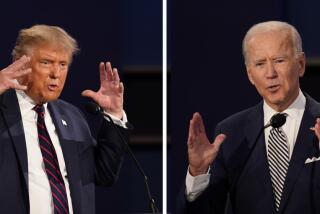‘08 in ’06
- Share via
THE TIME REMAINING on George W. Bush’s tenure in the White House is roughly the entire span of John F. Kennedy’s presidency, yet you’d think the commander in chief is already packing his bags, given all the talk about 2008. Second term-itis is a constant in American politics, it’s true, but Bush’s political setbacks have made the phenomenon much more pronounced.
At least Bush was able to joke about his travails Saturday at the annual Gridiron dinner thrown by Washington journalists. When Dick Cheney learned of the president’s 38% approval rating, Bush said, the vice president asked him what his secret was.
That same day, in Tennessee, Republican activists were checking out half a dozen prospects to succeed Bush in 2008. At a time when far more loyal Republicans are eager to distance themselves from the president, the ever-mischievous John McCain played the role of main Bush cheerleader, rightly defending the chief executive in the recent ports controversy. The Arizona senator would be a formidable candidate on the November 2008 ballot, assuming he could survive a Republican primary season frequently dominated by conservatives. Hence the cleverness of positioning himself as a Bush loyalist now; it’s all about bolstering his primary credibility.
The 2008 presidential election, which looks to be the most open contest on both sides of the aisle in many years, should acquire a great deal of intensity and urgency later this year. That’s partly because a credible candidacy will have to raise so much money -- at least $100 million before the first primary, according to some estimates.
At this absurdly premature stage, the two parties face opposite concerns. If Republicans have in McCain a formidable general election candidate who seems extremely vulnerable in his own party’s primaries, many Democrats are fretting that Hillary Rodham Clinton could prove unbeatable in their primaries but unelectable in November.
Clinton, if she decides to run, will be helped by a Democratic Party move over the weekend to allow up to four states to move their contests forward in the electoral calendar, to fall between the Iowa caucuses in January and the first week of February. The change will make it even harder for insurgent campaigns to gain traction over time, and it’s especially regrettable that the party will allow two of these contests to be caucuses -- where people have to attend a meeting and speak up for a candidate -- instead of primaries, which are far more democratic.
Lastly, if you are a sensible reader upset to be reading about the 2008 election this early on, get over it. We’re in for a long haul.
More to Read
Sign up for Essential California
The most important California stories and recommendations in your inbox every morning.
You may occasionally receive promotional content from the Los Angeles Times.













